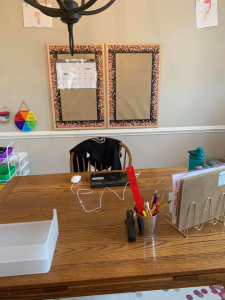For many families, the first week of school has looked a lot different than it has in years past. After all, who needs new shoes and a book bag when your school is inside your home and on a computer? As we embark into this new terrain, taking a minute to evaluate a few factors for how to make your child as successful as possible will be worth your time.
 Create a designated space
Create a designated space
There may be spaces in our homes that we are not utilizing and can be repurposed to serve as your child’s designated space for learning. In our home, we chose to transform our currently underutilized dining room into a classroom. We purchased some budget friendly bins to organize materials and labeled each bin to make it easy for my daughter to locate what she needs and where to put it back when she is done.
If you do not have a full room to transform, consider getting a rolling cart for a mobile school station. That station can then be moved from location to location based on the available space for learning.
Consider your seating options
Making sure your child is supported in their chair while learning will help tremendously in their ability to attend and be successful. While your child is seated in their chair, check to make sure they are following the 90-90-90 rule. This means your child should have a 90 degree angle at their ankles, knees and hips. You can modify seats you already have by putting a small stool under the child’s feet, a pillow behind their back and making sure their computer is at eye level.
There will be plenty of time to sit to do virtual learning, but thinking ahead to other positions the child can assume while learning will help to increase the amount of time they can pay attention. Making a space for standing work, lying on their stomach, or sitting on a ball on the floor can all help.
Make a sensory station
 Even adults need to move and fidget while they are learning for long periods of time, so make sure your child has appropriate resources on hand. In our home, we use the Zones of Regulation to help with self-regulation skills. Identifying the tools my daughter needs through the Zones of Regulation, such chewy necklaces, a wiggle cushion, and noodlin’ noodle’ stretchy strings, helps her to stay on track while learning.
Even adults need to move and fidget while they are learning for long periods of time, so make sure your child has appropriate resources on hand. In our home, we use the Zones of Regulation to help with self-regulation skills. Identifying the tools my daughter needs through the Zones of Regulation, such chewy necklaces, a wiggle cushion, and noodlin’ noodle’ stretchy strings, helps her to stay on track while learning.
Pack a lunch
Especially for parents who are also working from home while their child is virtually learning, this tip will save you a lot of time! Clear an easily accessible shelf in the fridge and/or pantry that your child can visit when it is time for their lunch or snacks. Pre-packing their lunch and prepping snacks ahead of time will allow your child to grab what they need and eat on their time without having to wait on you to get that ready for them.
Teach organization and independent skills
Building self-sufficiency by organizing and learning independently is a great skill for school-aged kids to master. Children will be expected to manage their time and learning resources in ways they were not previously expected to do. Spending time to help your children figure out how to organize and maintain those systems will help them to feel successful and confident in managing their learning.
Use your resources
As a parent and an occupational therapist, I know that being a parent and professional is a challenging dual role to navigate. If you find that your child is resistant to learning these skills from a parent, reach out to other resources and professionals that can help your family get set up for virtual learning! A trained occupational therapist can help assess how your child learns best and what additional supports might be needed to help make virtual learning successful for your family.
 Brittni Winslow has a master’s degree in occupational therapy and is executive director and owner of Emerge Pediatric Therapy in Cary and Durham. She and her husband have three young daughters.
Brittni Winslow has a master’s degree in occupational therapy and is executive director and owner of Emerge Pediatric Therapy in Cary and Durham. She and her husband have three young daughters.






